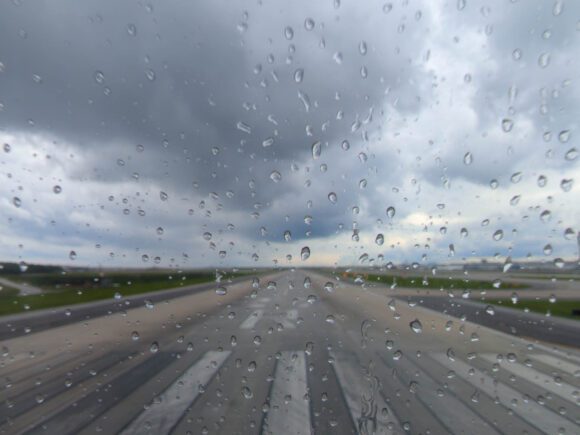The media are telling us that a new normal is coming for air transportation. Temperature checks, masks, and social distancing in lines are now likely to be adopted as changes to the way we travel. But nobody seems to be asking the question of why or whether they are necessary over the long-term.
We’ve had pandemic influenza outbreaks before, from the Spanish Flu to the Hong Kong Flu to SARS and haven’t needed to change our fundamental behavior in the wake of those outbreaks. Remember the Zika scare? What makes this one so different is that we are being told incessantly by the media and medical organizations that we will need to change and that a “new normal” rather than the old normal will be necessary. But nobody is asking the question why?
Perhaps I’m a skeptic, but I remain unconvinced of the long-term threat. COVID-19 is a serious respiratory influenza that seems to especially attack those with pre-existing conditions causing serious complications. But 89% recover and many more may have been exposed to the virus and remain asymptomatic without knowing it. While it is serious, the evidence that a quarantine of the population may not have been necessary is emerging, and that we may have damaged our economy and industry without much difference in the impact of the disease.
We still haven’t had adequate testing to know the degree to which the infection has spread and whether we will soon achieve herd immunity from natural immunity as a population. We do know that a major push for vaccination will occur. Remember Zika and the threat of unborn babies with shrunken heads from encephalitis? It now appears, of course not very well reported, that the majority of those issues may have been vaccine-induced and not the result of the mosquitoes. The great panic on the news in retrospect appears a purposeful way to deflect attention from the true cause.
Should we change everything for what could become simply a one season influenza that dies out, or mutates into a different strain for next year? Remember, this virus is called SARS-2. Well, we know SARS-1 didn’t have a second life and went away. But if past is prologue governments will attempt to keep whatever they do around forever. We’ve seen over-reactions before with TSA. One inept shoe-bomber resulted in millions of air travel passengers removing their shoes at security indefinitely, with no end to this practice on the horizon.
The effectiveness of the TSA for its own mission is questionable. In tests, the TSA missed 95% of weapons and other illicit materials brought through screening areas. An agency with a 5% success rate at finding weapons is unlikely to be particularly effective in medical screenings. While high temperature is a potential indication of someone in poor health, is temperature alone an adequate reason to keep someone off an airplane? Will there be MDs on staff to diagnose whether a passenger is well enough to fly? Will a higher than normal temperature keep a passenger off his flight? How high must the temperature register as too high? Is 99.6, one degree above normal, disqualifying? How accurate are those thermal screening devices?
There is a faction of the medical community pushing vaccination along with a “health passport” that, much like the yellow cards of the 1960s and 1970s that showed vaccination records and were needed to be shown in order to fly internationally. It seems to me that we are moving backward rather than forward in that regard.
Now we have ICAO chiming in that access to bathrooms onboard should be limited, including a designated bathroom for flight crews, and that meal and beverage services should be restricted on short-haul flights. They also recommend limiting carry-on baggage, forcing customers to check what would normally be cabin bags. My attitude is no thank you. If I need to go, I want to be able to do so before an accident occurs. I’d also like to enjoy a sandwich at mealtimes (even if I need to bring it aboard myself) which means I will need to remove my mask to eat. Oops, will that not be allowed either? With no bathrooms, no drinks, no food, and likely folks around you who will push the call button to turn you in for violating the rules, flying certainly won’t be any fun in the near term.
Changes in procedures are much like a government – once they are introduced they become a permanent part of the infrastructure, whether necessary or not. Is having your temperature checked at the airport to become a permanent part of travel? Will we need a new vaccination passport to be able to travel? Will we need to wear masks forever? Will social distancing require a redesign of airport gate areas?
The costs of changes in procedures, some of which may be long-lasting, may heavily outweigh the short-term benefits as airlines recover from this crisis. People are resilient, and after being confined to “flatten the curve” and thereby extend the epidemic, they are fed up with restrictions and suffering from economic uncertainty. A backlash against increased regulation and new procedures could occur.
Stress levels are very high and the George Floyd murder at the hands of four police officers has ignited an extremely frustrated population, made angrier by an undercurrent of being restricted to their homes, and in many cases now unemployed. Arbitrary restrictions might not be viewed as permanently necessary by a population that is frustrated with authority. One year from now, if this influenza fades, as many expect that it will, wearing masks and having temperatures taken may be viewed as an unnecessary and costly excess.
I was at the golf course over the weekend, and the newly installed shields between the driver and passenger in the golf carts have apparently not been well received, as 22 of their carts were vandalized by customers who removed them. This required the course to station an employee to check the condition of returned carts and for the number of each cart to now be registered to a golfer, rather than the former use any available cart process.
Life today is not normal, and people are taking out their frustrations in strange ways. Let’s hope people in charge of our industry consider the long-term impact of short-term actions, and that frustrations don’t migrate to airports as travelers return to the skies.
Views: 2




